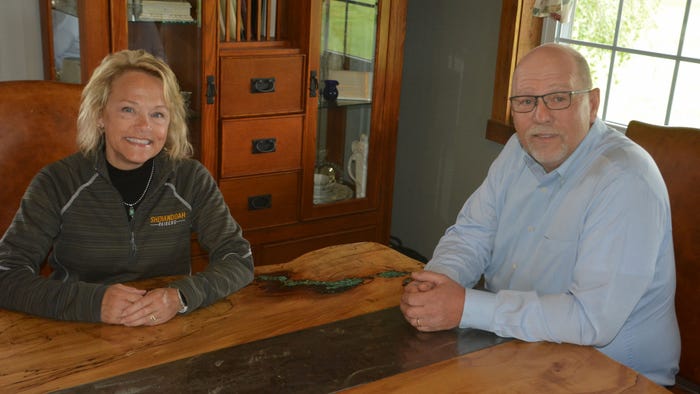
When Claire Trennepohl and Jesse Hoblyn married last September at Trennepohl Farms, it wasn’t in the backyard. Instead, it was in a pasture across the road.
“Claire asked if we could make one pasture resemble grass country in Nebraska where Jesse lived,” explains her father, Scott. “We normally focus on making it green and well maintained, but if it needed to look like Nebraska to make it memorable, yes, we could do that!”
And together, they did by not mowing or grazing that pasture all summer. That’s how much Scott and Judy Trennepohl, Middletown, Ind., care about their family and their farm.
Getting established
Scott’s grandfather Howard Gale bred Belgian horses on the farm where Scott and Judy now live. His parents, Tom and Judy, were part of that operation. Scott majored in agronomy at Purdue University, looking toward a career in crop management. However, his 4-H experience showing cattle and the opportunity to work with a professional showman, Nick Overpeck, Clinton, Ind., whetted his appetite for the beef industry.
After a few years working in industry, Scott returned to join his father and brother Jeff on the home farm. Eventually, Scott and Jeff formed a partnership. Early on, they concentrated on crops.
“Jeff’s kids had Simmentals, and I brought a few Shorthorn cattle, but we didn’t have a big herd,” he recalls. “Our serious entry into the cattle business was really about 4-H projects that went off the rails big time.”
Cattle operation
Trennepohl Farms Simmentals and SimGenetics have earned a spot on the national map, based on performance in show rings across the country. Scott and Judy’s daughters, Adrianne and Claire, both are accomplished showmen.
“We utilize artificial insemination and embryo transfer to propel elite genetics forward,” Scott explains. “We also emphasize breeding and selling high-quality bulls. One of our sales every year is strictly a bull sale, held in Zanesville, Ohio, closer to where commercial cattlemen in the Eastern U.S. who utilize our bulls are located.”
The Trennepohls use both spring and fall calving schedules, and carefully rotate pastures. They also have adapted existing facilities on some farms, making them as efficient for raising cattle as possible.
“It’s a working cattle farm — it’s not a showplace,” Scott says. “Don’t expect it to be free of mud and manure every day. Instead, we focus on making sure cattle are healthy, and providing facilities, nutrition and care to make that happen.”
Cropping operation
They still raise crops, and minimum tillage works on some fields, but on more erodible fields, they no-till, Scott says. He is trying cover crops, focusing on cereal rye.
When you’re viewing crops in the spring with one of the premier cattle producers in the country, you don’t expect to learn about the nuances of raising wheat, yet that may happen if you’re riding with Scott.
“We work with guys who sell us straw to emphasize that we need clean fields,” he says. “It may mean spraying herbicides, something not everyone does with wheat. We sell straw to dairymen who grind it up as a feedstuff, and we can’t have weeds. It may seem like a small detail, but it’s important to that business.”
Paying attention to details just like that one makes Trennepohl Farms successful.
Master Farmer at a glance
Age: 60
Location: Middletown, Henry County, Ind.
Beginning: Scott Trennepohl’s grandfather was a premier breeder of Belgian horses. Scott’s parents had off-farm jobs but worked long hours to create their own farming operation. After graduating from Purdue, Scott lived in Montgomery County, Ind., and worked in industry. He joined his dad and brother, Jeff, in the early ’90s, bringing a John Deere 4020 and a few Shorthorn cattle to their grandfather’s farm. He and Judy married in 1994.
Farm today: Scott and Jeff raise corn, soybeans, wheat and hay. They sell hay commercially and bale a large amount of high-quality straw, selling it primarily to large dairies as a feedstuff.
Livestock: Trennepohl Farms operates a nationally known Simmental and SimGenetics beef herd of about 225 cows. They use AI and embryo transfer to enhance elite genetics. Marketing includes a fall production sale and a spring bull sale in Zanesville, Ohio, plus two online sales.
Family: Their children are Adrianne Trennepohl, a content specialist with ABS; and Claire, a registered nurse, and husband Jesse Hoblyn, York, Neb.
Full-time employees: Dan May works with crops and Anthony Walton with cattle.
Leadership: Scott is past president and board member for Henry County Farm Bureau, was Indiana Farm Bureau District 9 director for nine years and served on the INFB insurance board for nine years. He has served on the Shenandoah School Corp. board since 2001, including the past 14 years as president. He is a member of the Indiana Simmental Association Board and Simmental Breeders Sweepstakes Board. He began serving as an American Simmental Association trustee in January.
Notable: Scott and Judy built their house attached to their farm shop.
Read more about:
Master FarmersAbout the Author(s)
You May Also Like




